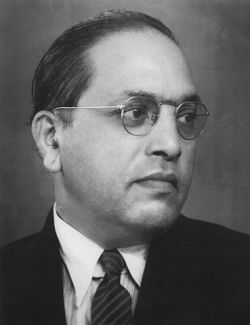B. R. Ambedkar: Difference between revisions
No edit summary |
No edit summary |
||
| (7 intermediate revisions by the same user not shown) | |||
| Line 1: | Line 1: | ||
{{#seo: | {{#seo: | ||
|title=B. R. Ambedkar – Indian | |title=B. R. Ambedkar Biography – Architect of Indian Constitution & Social Reformer | ||
|description=B. R. Ambedkar | |description=Dr. B. R. Ambedkar was a visionary jurist, economist, and social reformer who fought for Dalit rights and drafted the Constitution of India. | ||
|image=BR Ambedkar.jpg | |keywords=B. R. Ambedkar Biography, Dr. Babasaheb Ambedkar, Indian Constitution, Dalit rights, Indian jurist, social reformer, Bharat Ratna, Knowlepedia | ||
| | |image=https://knowlepedia.org/images/BR Ambedkar.jpg | ||
}} | |og:type=article | ||
|og:title=B. R. Ambedkar – Father of the Indian Constitution | |||
{{Infobox | |og:description=Explore the life of Dr. B. R. Ambedkar, India's chief Constitution framer, social reformer, and icon of equality and justice. | ||
| name | |og:image=https://knowlepedia.org/images/BR Ambedkar.jpg | ||
| image | |twitter:card=summary_large_image | ||
| image_caption = Dr. B. R. Ambedkar | }} {{Infobox deceased | ||
| birth_date | | name = B. R. Ambedkar {{Verified}} | ||
| birth_place | | image = BR Ambedkar.jpg | ||
| death_date | | image_caption = Dr. B. R. Ambedkar in the 1950s | ||
| death_place | | birth_date = {{Birth date|1891|04|14}} | ||
| nationality | | birth_place = Mhow, Central Provinces, [[British India]] (present-day [[Madhya Pradesh]], India) | ||
| occupation | | death_date = {{Death date and age|1956|12|06|1891|04|14}} | ||
| years_active | | death_place = [[New Delhi]], [[India]] | ||
| known_for | | resting_place = Chaitya Bhoomi, [[Mumbai]], [[Maharashtra]] | ||
| awards | | nationality = Indian | ||
| spouse | | occupation = Jurist, Economist, Social Reformer, Politician, Philosopher | ||
| children | | years_active = 1918–1956 | ||
| known_for = Architect of the [[Constitution of India]], Dalit rights movement, Social justice advocacy | |||
| notable_works = ''Annihilation of Caste'', ''The Problem of the Rupee'', ''Buddha and His Dhamma'' | |||
| parents | | awards = Bharat Ratna (1990, posthumous), First Law Minister of Independent India | ||
| | | spouse = Ramabai (m. 1906–1935), Savita Ambedkar (m. 1948–1956) | ||
| website | | children = Yashwant Ambedkar | ||
}} | | parents = Ramji Maloji Sakpal (father), Bhimabai Sakpal (mother) | ||
| religion = [[Hinduism]] (until 1956), then [[Navayana Buddhism]] | |||
'''Bhimrao Ramji Ambedkar''' (14 April 1891 – 6 December 1956) was an Indian jurist, economist, politician, and social reformer who was the principal architect of the Indian Constitution. A champion of Dalit rights and a prominent leader of the anti-caste movement, he dedicated his life to fighting inequality, untouchability, and social injustice. | | website = | ||
}}'''Bhimrao Ramji Ambedkar''' (14 April 1891 – 6 December 1956) was an Indian jurist, economist, politician, and social reformer who was the principal architect of the Indian Constitution. A champion of Dalit rights and a prominent leader of the anti-caste movement, he dedicated his life to fighting inequality, untouchability, and social injustice. | |||
== Early Life and Education == | == Early Life and Education == | ||
Ambedkar was born into a Dalit Mahar family, which faced severe caste discrimination. Despite this, he pursued education with determination. He completed his undergraduate studies at Elphinstone College, University of Bombay. He then studied at Columbia University, New York, earning a master's and a PhD in economics. | Ambedkar was born into a Dalit Mahar family, which faced severe caste discrimination. Despite this, he pursued education with determination. He completed his undergraduate studies at Elphinstone College, University of Bombay. He then studied at Columbia University, New York, earning a master's and a PhD in economics. | ||
Later, he attended the London School of Economics and Gray's Inn in London, becoming a barrister and completing a D.Sc. in economics. | Later, he attended the London School of Economics and Gray's Inn in London, becoming a barrister and completing a D.Sc. in economics. | ||
== Political Career and Social Work == | == Political Career and Social Work == | ||
Ambedkar founded several journals and organizations to uplift Dalits, including the Bahishkrit Hitakarini Sabha. He was a member of the Viceroy's Executive Council and played a key role in the Round Table Conferences in London. | Ambedkar founded several journals and organizations to uplift Dalits, including the Bahishkrit Hitakarini Sabha. He was a member of the Viceroy's Executive Council and played a key role in the Round Table Conferences in London. | ||
In 1947, he was appointed as the first Law and Justice Minister of independent India and chaired the Drafting Committee of the Indian Constitution. His legal acumen and vision led to the framing of a constitution that ensured equality, liberty, and justice for all. | In 1947, he was appointed as the first Law and Justice Minister of independent India and chaired the Drafting Committee of the Indian Constitution. His legal acumen and vision led to the framing of a constitution that ensured equality, liberty, and justice for all. | ||
== Conversion to Buddhism == | == Conversion to Buddhism == | ||
In 1956, a few months before his death, Ambedkar converted to Buddhism along with over half a million followers, initiating the Dalit Buddhist movement in India. This was a major milestone in India's socio-religious history. | In 1956, a few months before his death, Ambedkar converted to Buddhism along with over half a million followers, initiating the Dalit Buddhist movement in India. This was a major milestone in India's socio-religious history. | ||
== Legacy == | == Legacy == | ||
Ambedkar passed away on 6 December 1956. He was posthumously awarded the Bharat Ratna in 1990. His life and work continue to inspire millions across the globe. Numerous institutions, statues, and memorials have been established in his honor, and his birth anniversary is celebrated as Ambedkar Jayanti. | Ambedkar passed away on 6 December 1956. He was posthumously awarded the Bharat Ratna in 1990. His life and work continue to inspire millions across the globe. Numerous institutions, statues, and memorials have been established in his honor, and his birth anniversary is celebrated as Ambedkar Jayanti. | ||
== References == | == References == | ||
<references/> | <references/> | ||
[[Category:People from Madhya Pradesh]] | |||
[[Category:1891 births]] | |||
[[Category:1956 deaths]] | |||
[[Category:Recipients of the Bharat Ratna Award]] | |||
[[Category:Indian jurists]] | |||
[[Category:Indian economists]] | |||
[[Category:Articles needing expansion]] | |||
[[Category:Articles needing more references]] | |||
Latest revision as of 08:07, 7 August 2025
| B. R. Ambedkar | |
|---|---|

| |
| Dr. B. R. Ambedkar in the 1950s | |
| Born | 14 April 1891 |
| Birthplace | Mhow, Central Provinces, British India (present-day Madhya Pradesh, India) |
| Died | 06 December 1956 (aged 65) |
| Place of death | New Delhi, India |
| Resting place | Chaitya Bhoomi, Mumbai, Maharashtra |
| Nationality | Indian |
| Occupation | Jurist, Economist, Social Reformer, Politician, Philosopher |
| Years active | 1918–1956 |
| Known for | Architect of the Constitution of India, Dalit rights movement, Social justice advocacy |
| Notable works | Annihilation of Caste, The Problem of the Rupee, Buddha and His Dhamma |
| Awards | Bharat Ratna (1990, posthumous), First Law Minister of Independent India |
| Spouse(s) | Ramabai (m. 1906–1935), Savita Ambedkar (m. 1948–1956) |
| Children | Yashwant Ambedkar |
| Parents | Ramji Maloji Sakpal (father), Bhimabai Sakpal (mother) |
| Religion | Hinduism (until 1956), then Navayana Buddhism |
| Website | |
Bhimrao Ramji Ambedkar (14 April 1891 – 6 December 1956) was an Indian jurist, economist, politician, and social reformer who was the principal architect of the Indian Constitution. A champion of Dalit rights and a prominent leader of the anti-caste movement, he dedicated his life to fighting inequality, untouchability, and social injustice.
Early Life and Education
Ambedkar was born into a Dalit Mahar family, which faced severe caste discrimination. Despite this, he pursued education with determination. He completed his undergraduate studies at Elphinstone College, University of Bombay. He then studied at Columbia University, New York, earning a master's and a PhD in economics.
Later, he attended the London School of Economics and Gray's Inn in London, becoming a barrister and completing a D.Sc. in economics.
Political Career and Social Work
Ambedkar founded several journals and organizations to uplift Dalits, including the Bahishkrit Hitakarini Sabha. He was a member of the Viceroy's Executive Council and played a key role in the Round Table Conferences in London.
In 1947, he was appointed as the first Law and Justice Minister of independent India and chaired the Drafting Committee of the Indian Constitution. His legal acumen and vision led to the framing of a constitution that ensured equality, liberty, and justice for all.
Conversion to Buddhism
In 1956, a few months before his death, Ambedkar converted to Buddhism along with over half a million followers, initiating the Dalit Buddhist movement in India. This was a major milestone in India's socio-religious history.
Legacy
Ambedkar passed away on 6 December 1956. He was posthumously awarded the Bharat Ratna in 1990. His life and work continue to inspire millions across the globe. Numerous institutions, statues, and memorials have been established in his honor, and his birth anniversary is celebrated as Ambedkar Jayanti.

